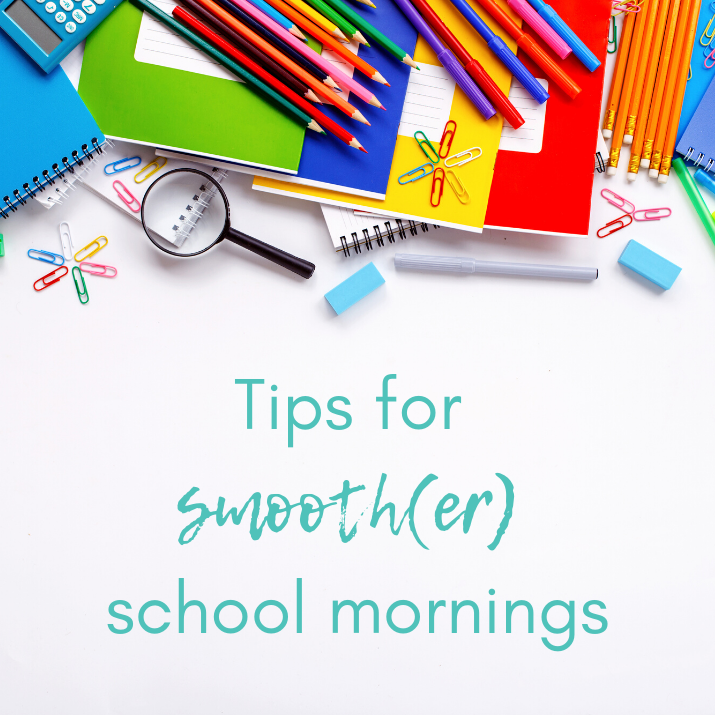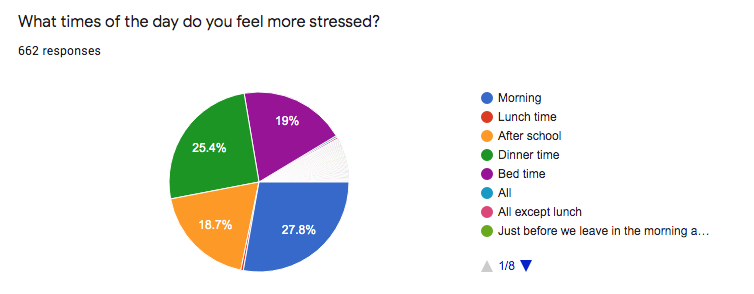
This post is part of a series on how we can manage the stress of family life. You can find other posts in the series by clicking here.
I am currently making my way through the results of the Planning with Kids annual survey. In this year’s survey, I asked a number of questions around stress and family life and one of them was about what time of the day parents are feeling more stressed.
As you can see in the pie chart below, mornings were the most stressful time with 27.8%, then dinner time at 25.4%. Having had 5 kids under 10, I can relate to finding those times stressful.

The book ends of the day, have the most work involved and require the most co-operation from the kids so that undoubtedly contributes to the stress levels. Today I will share with you some tips that worked for us to make school mornings run smoother at our house.
Prepare the night before
As tempting as it is to flop onto the couch once the kids are finally in bed to relax, hold off for just 30 minutes and do some basic preparation for the next day. The younger your kids are the more important this step is.
In the mornings if you need to be feeding a baby, wrangling a toddler or spend time negotiating with a preschooler, you need as much time up your sleeve as possible. Making lunches amongst all of those challenges will take you twice as long and the task will seem much harder than it is because you can’t work on it for more than a minute or two at a time.
Here is a list of things that you can do the night before which will make your mornings smoother, some of them you can do with the kids earlier in the evening before they go to bed:
- Make the kids’ lunches. You can see my school lunch box process here.
- Make your lunch for work if needed, you can see some easy meal prep lunch ideas here.
- Have the kids get their clothes ready for school and help the younger kids choose their clothes and have them out ready. Much easier to negotiate on weather-appropriate clothing in the evening, than when you are limited for time and want to get everyone out the door.
- Get your clothes ready for the next day.
- Complete any school notices.
- Have the kids pack their bags for the next day – eg have their library book in the bag, have their homework packed, etc.
- Have your bag packed for the next day, whether it be stocking up the baby bag or prepping your work bag or both!
- Have the kids pick up their belongings and put them away before they go to bed.
- Do a general reset of the house. This is not about perfection, but making sure everything is back in its place so it can be easily found when needed. Who wants to spend 5 minutes in the morning looking for the keys?
- Check the calendar to make sure you are prepared for what the next day brings.
Get enough good quality sleep
I know this is often easier said than done when you have kids waking up at night. As the parent, the more well rested we are, the better we are able to manage the stress of school mornings.
As the primary carer, we very much lead the mood and energy levels of the house. If we are tired and grumpy, it spreads like wildfire, so it is really in our best interests to keep ourselves well rested.
Broken sleep is always hard, but if we know that it is a season of life where we are going to get interrupted sleep, then we need to make wise choices in the evening. While we may love sitting down and watching a few episodes of our favourite Netflix series or spending some time catching up online via social media, this isn’t going to help us get more sleep.
We need to be disciplined about what is referred to as “sleep hygiene”. Sleep hygiene refers to the habits that help you have a good night’s sleep. It isn’t just the number of hours of sleep you get, but the quality of sleep you have at night that makes a difference in how you feel in the morning. Here are some things you can do to improve sleep hygiene:
- Avoid caffeine, alcohol and other substances that interfere with sleep.
- Establish a pre-bedtime routine to help cue your body it is time for sleep, so you can get off to sleep each night quickly.
- Aim for a consistent bedtime across the week to help set your body’s “internal clock” so it begins to expect sleep at a certain time each night.
- Reduce blue light exposure in the evening. Blue light is the light emitted from electronic devices like smartphones, computers, TVs etc. Exposure to blue light makes your brain think that it is still daytime and reduces hormones like melatonin which are needed to help you relax and get to sleep. It is recommended to stop using screens at least an hour before you want to go to sleep.
- Have a dark, cool room for sleeping.
Build in a buffer
Sleep is precious and as I just noted above we need to get enough of it, but we also need to make sure we get up at a time in the morning that has at least a 15 minute buffer built in to it.
Often we get up at a time that is reasonable to get everyone ready if all was to go exactly to plan and there were no issues in the morning. The reality of life with little kids is there is going to be more days with issues than those without.
Building in buffer gives you the space to be able to respond to any issues that arise in a calmer fashion and helps you avoid the escalation trap. If you are not familiar with the escalation trap the below is an example of the escalation trap in action:
- Kids are dragging their feet and not moving through their tasks to get ready.
- Mum feeling time-pressured snaps at the kids to get ready.
- Kids feeling pressured either whine, argue back or sulk delaying further the getting ready process.
- Mum responds with more demands, perhaps with a little louder voice this time.
- One kid then snaps at another kid and they begin to argue, getting further off track with the getting ready process.
- Mum enters the fray, telling both kids off and ends up dressing them or finishes off packing their bags at a frantic pace in an effort to get everyone out of the house in time.
- Eventually, everyone leaves the house feeling frazzled and running behind schedule.
If you have more time up your sleeve, you can stop and talk calmly to the kids at point 2 and often help prevent the escalation that occurs from that point onwards if you snap or get grumpy with the kids.
Teach the kids to get themselves ready
This point requires you to build lots of extra buffer in your mornings for the short term, but it will pay great dividends over the longer term. From preschool age, kids can start being responsible for getting themselves ready.
You can see some examples of routines and charts that will help kids get themselves ready and download some free templates here – Children’s Routines.
Limit distractions
We have always been a no screen before school family. From about year 10 (age 16) onwards though we found it almost impossible to enforce with the older teenagers, but we still enforce it for the younger kids. Not having a TV or other screen to distract them, allows them to focus on getting ready, not what is on the screen.
Practice mindfulness
It can seem like a strange one to end on, but practicing mindfulness in the morning can really help things run smoother. Mindfulness doesn’t mean you have time to sit down quietly with a cup of tea for five minutes on your own (wouldn’t that be amazing!), but it simply means being fully present in the moment.
We all have long to-do lists and it is tempting to start working on them in our mind as we go about getting ready in the morning. We may start thinking about the deadline we have at work or start worrying about how we are going to get through the afternoon’s schedule of after school activities with a tired toddler who didn’t sleep well last night.
But if we are thinking about these things first thing in the morning, we are increasing our own stress levels unnecessarily. Nor are we are being present with the kids and that is often when miscommunication can happen – eg, the kids ask us something, we didn’t really listen properly and we may agree to something that we didn’t mean to. Or we may have missed some cues that things were falling apart with the little ones and it turned into a mess, that we could have prevented if our mind wasn’t miles away on something else.
Mindfulness is a practice and school mornings are the perfect training ground. I know there are mornings where I am distracted by my to-do list and it definitely impacts how smooth the mornings are. Kids have an innate ability to pick up on whether or not we are really there with them and it alters their behaviour if they feel that they are not being listened to.
